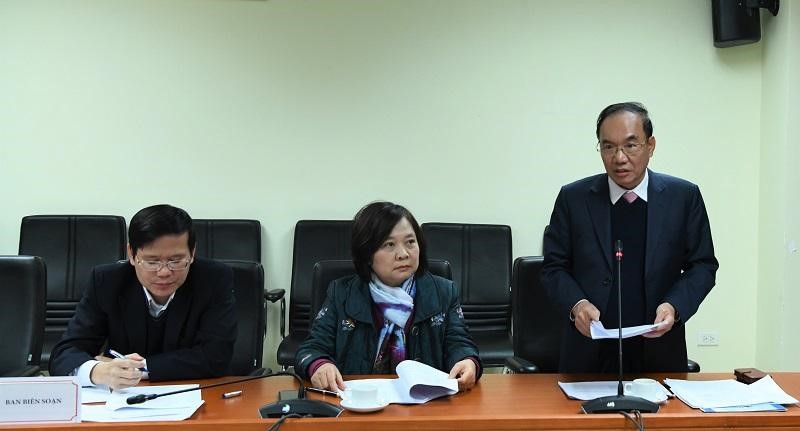On December 29, 2022, at the State Audit Office of Viet Nam Headquarters (SAV) - 116 Nguyen Chanh, Cau Giay, Ha Noi, the Council for the Appraisal of Syllabus for the "State Budget Management" held a meeting to collect comments on the completion of the curriculum. The Appraisal Council was chaired by Dr. Ha Thi My Dzung - Deputy Auditor General.

Overview of the meeting
At the meeting, the Editorial Board of State Budget Management Outline presented an overview of 05 main contents of the curriculum, including: Chapter 1- Overview of state budget management; Chapter 2 - State budget estimate preparation and decision; Chapter 3 - State budget execution; Chapter 4 - State budget audit and finalization; Chapter 5 - State budget management assessment.
The duration of the course is structured into 32 sessions;17 of which are theoretic, 13 are practical; and 02 are for review and test. The curriculum is built with an open approach in order to continue updating and supplementing in accordance with real life practice. At the end of each topic, there are discussion questions and a list of references and bibliographies.
The targeted trainees are State Auditors participating in the training program for the rank of Auditor; students who have studied the subject "Public financial management and public assets", and those who need to foster and supplement professional knowledge and skills in state budget management according to the decision of Auditor General.

The Editorial Board gives an overview of the content of the curriculum outline for the State Budget Management
The course will equip learners with theoretical and professional knowledge of state budget management and SAV's role in auditing state budget settlement (including making and deciding on estimates, implementing and finalizing state budget). However, for further improvement, the Appraisal Council requested the Editorial Board to review, edit and supplement a number of contents: State budget accounting; edit terms such as "objective" to "role" of the state audit in state budget audit. In addition, consider renaming Chapter 4 "State budget audit and finalization" to: "State budget accounting, finalization and state budget management assession"; revised Chapter 5 from the title "State budget management assessment" to "Audit of State Budget Finalization"; review all audit topics in all chapters to ensure consistency, avoid repetitiveness and highlight SAV's roles and tasks in state budget management.
The Appraisal Council also suggested the Editorial Board to review and add the following contents: State budget surplus, regulations on management, use and finalize surplus sources; state budget deficit , regulations on sources of overspending, management, use and finalize of overspending sources; increase state budget revenue, regulations on management, usage and finalization of revenue increase sources; state budget revenue deficit, regulations on handling when state budget revenue shortfall; state budget balance, regulations on handling, management, use and settlement of budget balance sources; how to calculate the rate of distribution of revenues between the central budget and the local budget, the balance supplement for the budget of the lower level; state budget accounting and Treasury And Budget Management Information System (TABMIS); framework, management, usage and finalization of budget reserves, financial reserves, funds, loans...
Concluding the meeting, the Appraisal Council’s Chairwoman – Dr. Ha Thi My Dzung suggested that while the "State Budget Management" was wide in scope, the curriculum outline developed by the Editorial Board included only 32 periods, which was a bit short. Therefore, it is suggested that the Editorial Board to edit the duration of the syllabus into 40 periods basing on the regulations of the State. At the same time, she urged the Editorial Board to assimilate the opinions of the Appraisal Council members to edit and complete the curriculum before submitting it to the authorities for promulgation./.